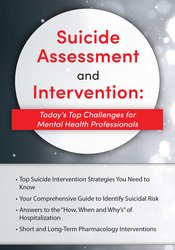

What would you do?
“I woke up this morning and decided I didn’t have anything to live for. I told my dad that he would find me dead when he came home,” said Michelle, a 13-year-old girl sitting in a hospital bed. Her father reacted to his daughter’s declaration by bringing her to the hospital. I was asked to assess Michelle.
After some introductions and an explanation as to why I was there, Michelle agreed to speak with me by herself.
“So, was today the first time you’d had thoughts of killing yourself?” I asked.
“Yes,” she replied, “I woke up tired of feeling this way, you know, depressed.”
“Have you thought about how you might try to kill yourself?”
"Not really; I figured I’d look around the house to see what I could use,” she stated.
What would you do next? Is this a person who needs to be hospitalized? How would you handle this situation differently if you were seeing Michelle in your office instead of a hospital?
Suicidal behaviours and suicidal ideation represent some of the most challenging things we deal with as clinicians.
Watch this recording to learn how to help your most vulnerable clients with the real-life skills and knowledge they don’t teach in graduate school.
| File type | File name | Number of pages | |
|---|---|---|---|
| Manual - Suicide Assessment and Intervention (4.1 MB) | 70 Pages | Available after Purchase | |
| Manual - Suicide Assessment and Intervention - French (4.1 MB) | 70 Pages | Available after Purchase | |
| Manual - Suicide Assessment and Intervention - Italian (4.1 MB) | 70 Pages | Available after Purchase | |
| Manual - Suicide Assessment and Intervention - German (4.1 MB) | 70 Pages | Available after Purchase | |
| Manual - Suicide Assessment and Intervention - German (4.1 MB) | 70 Pages | Available after Purchase | |
| Manual - Suicide Assessment and Intervention - Spanish (4.1 MB) | 70 Pages | Available after Purchase | |
| Manual - Suicide Assessment and Intervention - Spanish (4.1 MB) | 70 Pages | Available after Purchase |

Paul Brasler, LCSW, CAIMHP, became a licensed clinical social worker in 2002. Paul is the coordinator for the Chesterfield County (Virginia) Employee Behavioral Health Program, through which he and his team provide clinical services to first responders and human services personnel. He has extensive experience working with people in crisis and people living with substance use disorders, including adolescent residential treatment, community mental health settings, hospital emergency departments, juvenile drug court, and private practice.
Paul has been a national presenter (through PESI) since 2016, and he has presented classes across the country on mental health emergencies, high-risk clients, resiliency, and a certification course for clinicians working with people with substance use disorders. He has written three books: The Clinician’s Guide to Suicide Management, PESI Publishing, 2025; The Clinician’s Guide to Substance Use Disorder, PESI Publishing, 2022; and High-Risk Clients, PESI Publishing, 2019. Paul lives in Richmond, Virginia, with his beautiful wife, three sons, cowardly dog, and two dwarf rabbits who are quietly plotting to destroy the world.
Speaker Disclosures:
Financial: Paul Brasler maintains a private practice and has an employment relationship with Chesterfield County. He receives a speaking honorarium, recording, and book royalties from Psychotherapy Networker and PESI, Inc. He has no relevant financial relationships with ineligible organizations.
Non-financial: Paul Brasler has no relevant non-financial relationships.
Please wait ...